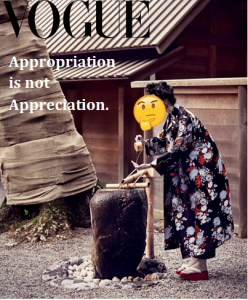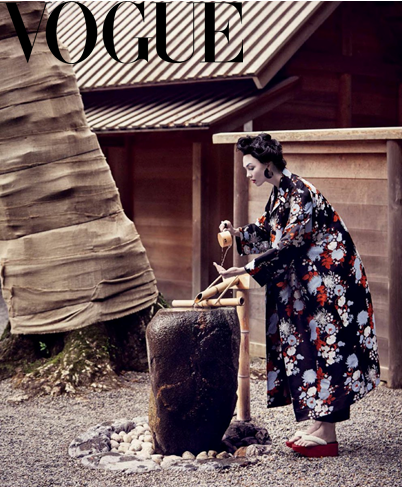The Original
This image is part of a six page editorial spread, titled “Spirited Away,” and is featured in Vogue’s upcoming March 2017 “Diversity Issue.” The spread was photographed in Japan by Mikeal Jansson and styled by Phyllis Posnick. Vogue states that the editorial campaign was inspired by traditional Japanese culture. The campaign features Karlie Kloss, a white supermodel, dressed as a traditional geisha with thick black hair and pale skin, in a kimono dress, posed in front of various Japanese backgrounds.
Vogue magazine is under scrutiny for choosing to feature banal orientalist visuals of stereotypical Japanese culture. Although Vogue magazine is promoting diversity as the theme of their newest publication, it does not seem to be in touch with the meaning of true racial diversity in the year of 2017. What is blindingly worse is the irony of choosing a white woman to pose as a cultural Japanese symbol rather than featuring an actual Japanese model. Both Vogue magazine and Kloss are being accused of appropriating Asian culture and for featuring “yellowface.” Cultural appropriation is broadly defined as the use of one culture’s symbols, artifacts, genres or technologies by members of another culture (Rogers, 2006). Cultural appropriation has immense negative connotation because it is linked with the exploitation of marginalized groups by dominant cultures. Appropriating geisha culture by using historically rooted garments to promote and benefit Vogue’s latest issue is appalling for a company that claims to support equality amongst all people. The other problem at hand is the feature of yellowface, a colloquial term for the use of theatrical makeup by white entertainers to represent an East Asian person. Yellowface has been prevalent throughout the years in various Hollywood films and other media. Asian minority groups have called out against this negative practice as it endorses the false portrayal of Asian cultures, customs and behaviours, usually in the perspective of white people.
Upon receiving the criticism, Kloss issued a public apology but nothing is yet to be heard from Vogue magazine. I am looking forward to further explanations of the company’s actions.

My Jammed Version
For my “culture jam” I edited two new features to the original image. I first chose to add a new message to the picture that reads “Appropriation is not Appreciation.” The prevailing counter-argument to cultural appropriation is that it is merely appreciating the facets of another’s culture. In this instance, the editorial is seemingly coming from good natured intentions, which is to promote cultural diversity by way of appreciating traditional Japanese practices. However underneath the chic aesthetic of the editorial, it is evident that Vogue has reduced the significant style of Japanese geishas to a simple fashion statement. Furthermore, white western cultures have notoriously spread the stigmatization of geisha culture in the past by linking it to prostitution. Although Vogue is not responsible for introducing these backwards stereotypes, it has neither taken the steps to eliminate these stigmas, or even broadly, help end micro-aggressions against Japanese and other Asian people. It is possible to appreciate another group’s culture without stripping away its values, and that is by respecting cultural significance and practicing solidarity.
The second feature that I included in the “culture jammed” version of the image is a picture of a yellow faced emoji covering Karlie Kloss’ face. Vogue magazine is not the first fashion and beauty brand to advertise yellowface. In fact, there is a current “white-washing” of Asian roles in various entertainment and fashion industries in the Western society. White rather than Asian models and actors are being given Asian roles in films, editorials and other media. The problem is not due to a lack of talented Asian entertainers but a lack of opportunities to tell authentic Asian stories in the media, as well as the active practice of yellowface. The under-representation of authentic Asian people and Asian culture in the Western media is one of the underlying forces that drive the oppression of Asian people living in Western countries. I think this issue is very important because it influences the way many people perceive each other and themselves. Vogue and the vast number of beauty and fashion brands must bring awareness to these problems and take the initiative to combat them.
Reference
Rogers, R. A. (2006). Cultural Exchange to Transculturation: A Review and Reconceptualization of Cultural Appropriation. Communication Theory, 16(4), 474-503.

